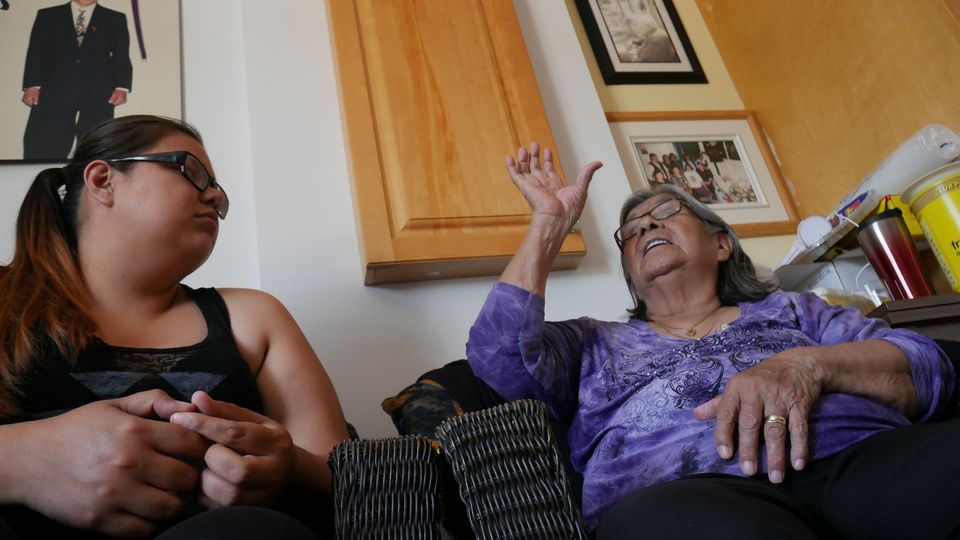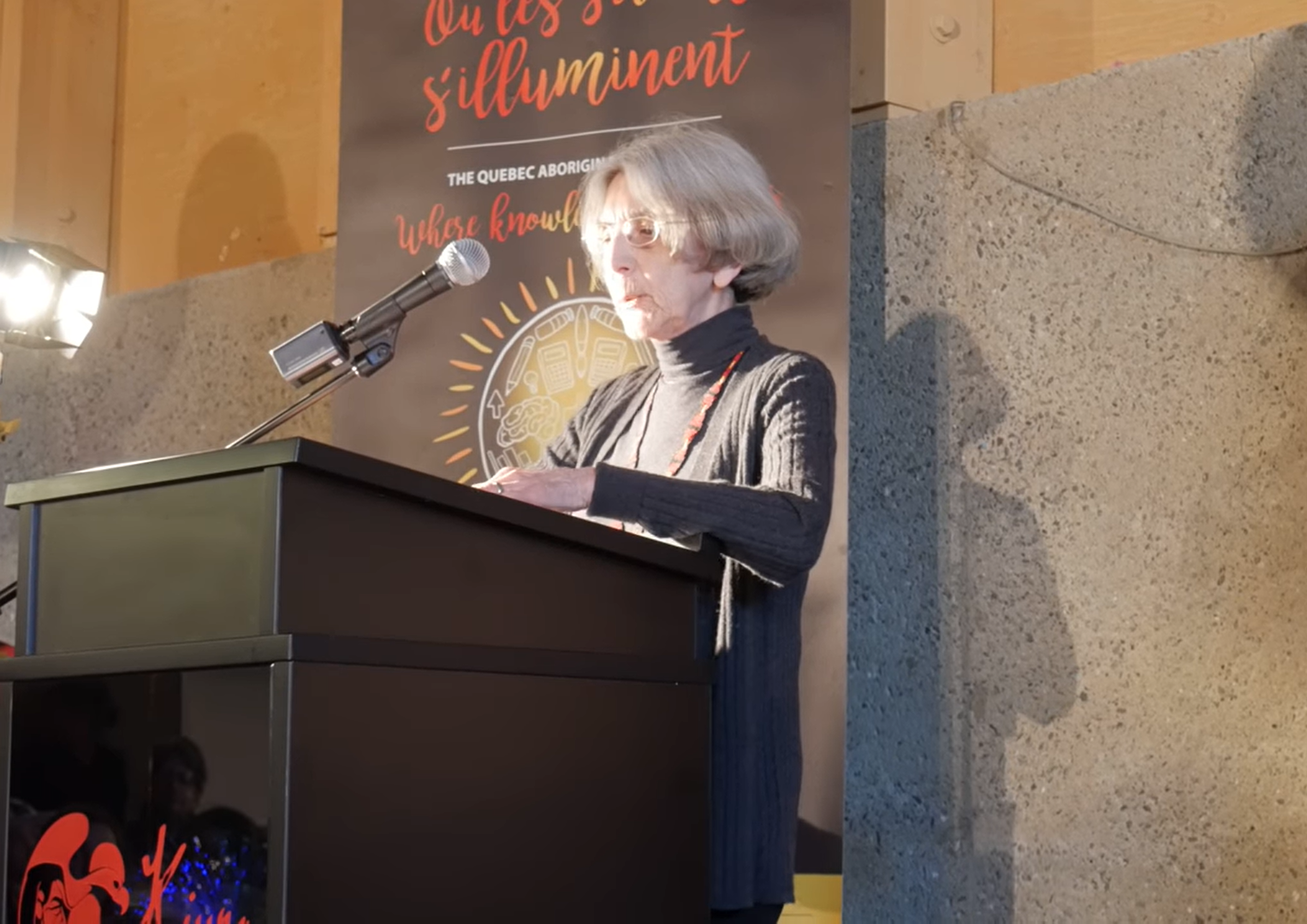Keep exploring here
Language ~ Traditional practices
The transmission of stories is an essential feature of Indigenous societies, especially when they are told in their original language. The mere telling asserts the resilience and strenght of Indigenous peoples. In the summer of 2016, I was invited to the Atikamekw community of Manawan. Over the week-end, I was deeply honored to take part into the celebrations of Marie Kristine's family. Her grandmother (kokom) Thérèse celebrated her 80's birthday, which also happened to be the same day as her 65th year of marriage with her recently deceased husband. The story she shared was foundational and meaningful in that mourning and feasting context. «The making and telling of our stories teach us to do more than react to and survive in thi world; they bring us ways to heal our selves, our families, our communities.» Emerance Baker, Loving Indianess: Native Women's Storytelling as Survivance
Marie Kristine asks her kokom to tell a story
«I don’t know which story I could tell...» The kokom said. Isabelle and Louise, the kokom’s daughters, ask her to tell the story about the tornado. MK asks if she remembers. Kokom says yes, she was 5 years old. Louise adds: «Grandpa was 9 because he was 4 years older than her.»
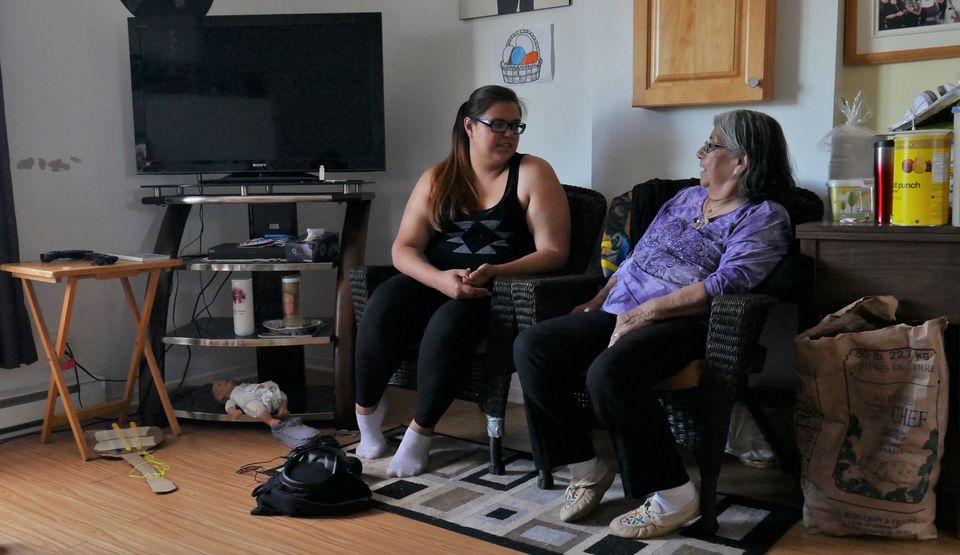
Kokom turns to her sister Annie. «We were both going to school, right? We were young, we must have been 5 years old or so. Our sister Lucie was also going. I don’t think our brother Dominic (the youngest brother) was going yet. The classes were held at the church back then. The teacher was a nun. That day, a man walked in the church and told the nun to take the kids out. There was a storm coming. It was particularly windy that day. The man told us to run away. I didn’t see the man, I didn’t see who it was because I didn’t turn back to look. So we all stood up to run out of the church but the nun wanted us to pray before going. The man got mad and told them there was no time for that. We had to get out of the church. Everybody was running. I don’t even remember who was at school with me, I was so scared. I didn’t even think about looking for my older sister before going out.»
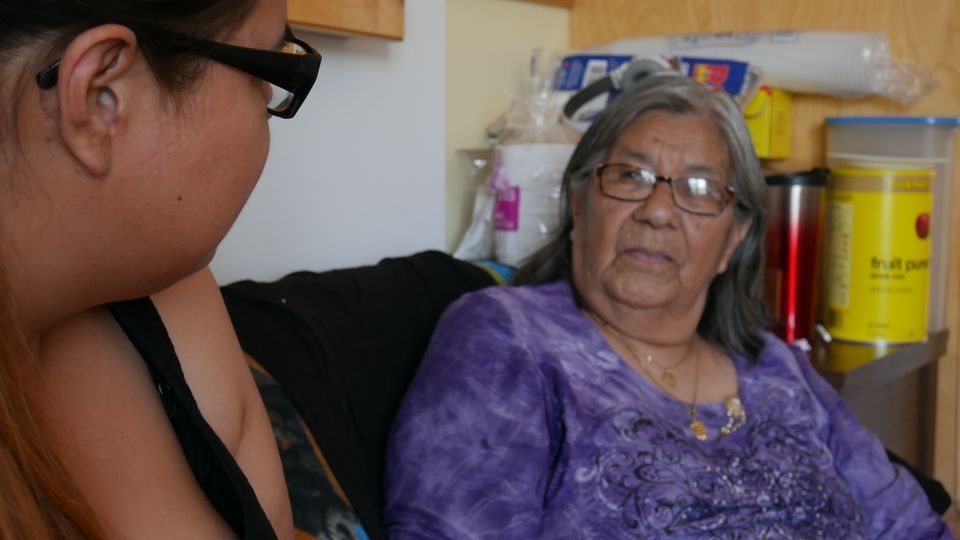
The kokom now turns to MK. «The priest went out from the front and as I watched him run away, I saw a part of the roof and the wall being pulled by the tornado. All of a sudden, there was a lot of light inside the church. Kids started running out by the hole the tornado created. Some were injured. Nails were sticking out the walls and a lot of the kids were hurt by those nails. Some had open wounds because of those nails. I decided to go out by that hole too. Some would slide on the floor as they went out and they’d fall on the grass because the church was higher than the ground. I remember I was sobbing. I was terrified because of the rain and the thunder. The sky was really dark. A tornado* went through the church, right where we were all sitting minutes before. All the kids were crying, sobbing.» *Psitosiw, it was a new word for MK, translated right away by Isabelle.
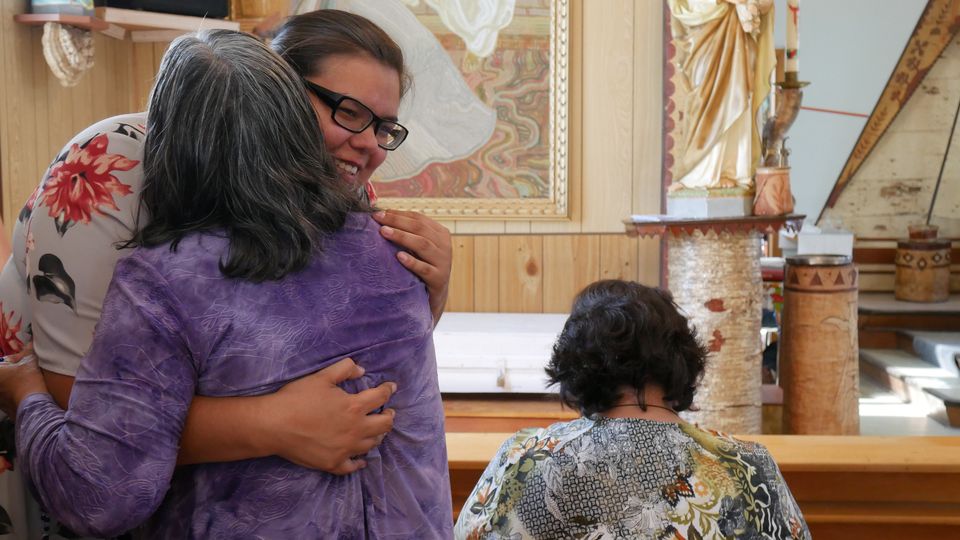
«I feel a hand gripping mine*. And the boy who gripped my hand started running, pulling me with him. He took me further away, in security. We were running, hand in hand, and got to this house, looking for shelter. W e were soaking wet and our hosts gave us and the other kids who followed towels (*10 years later, that’s the man she married*). Your grandfather always like reminding me of that story. He always said that God wanted him to save me so that we could marry later. I don’t remember anything after we got to the house. I don’t even remember if my parents came to get me.» *Transcript comment of Marie Kristine
The story was filmed by Louise Romain, transcripted and translated from Atikamekw to English by Marie Kristine Petiquay.
Full original recording in atikamekw:The video has been edited by non-Atikamekw speakers. The full original sound recording can be found above.
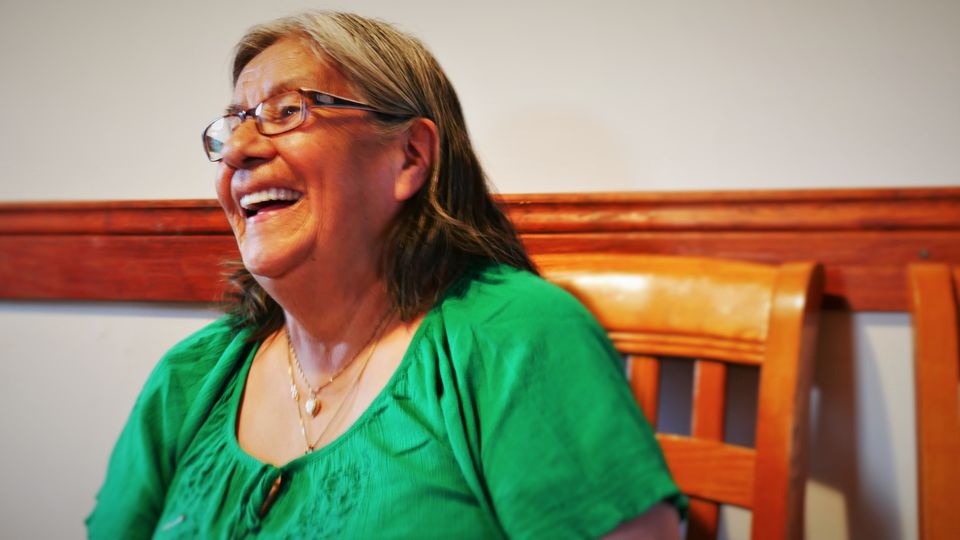
Kokom Thérèse by her granddaughter Marie Kristine Petiquay, Manawan, April 2016, from the participatory workshop on language.
«My kokom speaks mostly atikamekw. With her, I realized that I was slowly loosing my language, I have to look for my words. It makes me sad that my language is going away... even though I still speak it you know! I learned french when I was 2 years old et the Disney movies taught me a lot. Most of the youth in Manawan speak french. I would like to pass on the Atikamekw language to my children.»
 Insight into my anthropological journal ~ June 19th 2016, Manawan
Insight into my anthropological journal ~ June 19th 2016, Manawan
«I felt very honored to be welcomed with so much generosity, simplicity and goodness. I felt confortable most of the time and I found particularly interesting to observe my internal patterns, to make them conscious and to oblige myself to keep my mouth shut. Generally, it was at times hard to stay silent -not to ask questions- and at other times, it felt more natural. The more I kept quiet, the more the silence became familiar. I realized that my ways to help, to show something new, something different, and my approach towards being together, are largely shaped and defined by my culture. I had to learn to stay at my place, with my words and with my body. I perceived this understanding as part of the process of self-decolonizing (even though it's still unclear to me). I felt particularly well during the transmission of the story: my function, my role at that time, the space I had reached in such a short amount of time spent with the family. I was invited to come back, which is always a clear sign that I have been a good guest. I hope the opportunity will present itself.» Louise Romain Watson
Reading of an Abenaki prayer by Monique Nolett Ille
Aln8baï Aïamih8mek
Kchi Niwaskw, kizi nodamna lal8mow8gan kzel8menek, tbestawi! Askwa ndaw8ssiwi ta npiwssessi, nd'achwaldam wijokamw8gan ta sasaginnow8gan. Ntawakol chiba tbestak klal8mow8gan; nsizekol askamiwi namitoak toji wskiwligek nakilh8d kizos; neljial wlilawatoak kdakina. K'nadodmol wji milian waw8damw8gan wji kizi n'kinamotlhowa kkawajow8gan nijiak; llagidamw8gan k8ttlezid al8miwi wanibagok ta nagwiwi senek. Kchi Niwaskw, k'nadodmol wji kizi mlikigia, nda wji paami waw8damoa ndaki nijiak, kanwa wji kawhowa nkadonalgoakw niatta. Ni chiga ma8wi adoji machinaa, n'kiziji wanaskol wlidbimiwi.
La prière d'un indien
Ô Grand Esprit, dont la voix se fait entendre dans le vent et qui d'un souffle anime tout l'univers, écoute-moi! Je suis un de tes enfants, petit et faible, j'ai besoin de ton aide et de ta sagesse. Que mes oreilles soient attentives à ta voix; que mes yeux contemplent à jamais la splendeur d'un soleil couchant; que mes mains respectent ta création. Rends-moi sage, afin que j'apprenne ce que tu as enseigné à mon peuple; la leçon cachée en chaque feuille et sous chaque rocher. Je demande la force, non d'être supérieur à mes frères, mais de combattre mon pire ennemi, moi-même. Fais que je sois toujours prêt à venir à toi les mains sans taches, le regard limpide. Quand ma vie s'éteindra comme un soleil couchant, je veux que mon âme puisse aller vers toi en toute confiance.
Abenaki transcription and translation from Cécile Wawanolett
